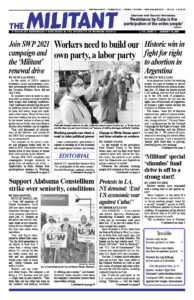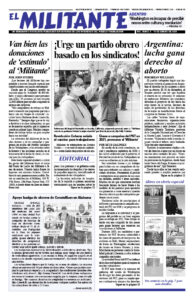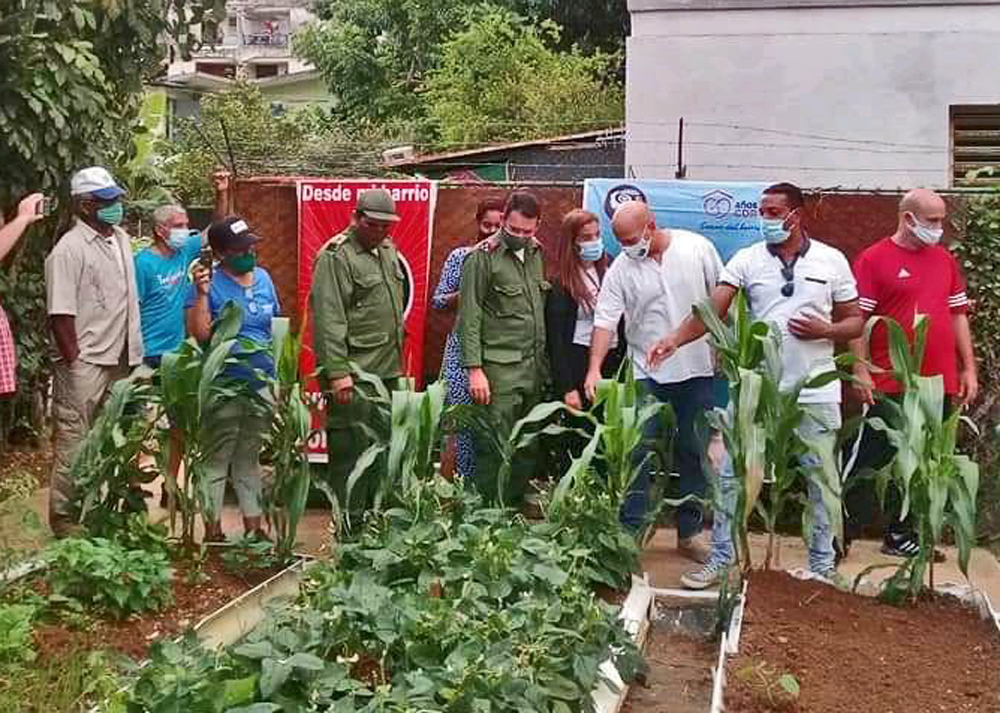Below are major excerpts from remarks made by Gerardo Hernández during a program sponsored by the Cuba Solidarity Campaign in the United Kingdom. It was streamed live on Dec. 14, to mark the sixth anniversary of the release of the Cuban Five from U.S. prisons.
On Dec. 17, 2014, Gerardo Hernández, Ramón Labañino and Antonio Guerrero were freed, joining René González and Fernando González in Cuba — ending more than 16 years of imprisonment of the Cuban Five on frame-up charges in the U.S.
Hernández was elected last September as national coordinator of the Committees for the Defense of the Revolution, Cuba’s largest mass organization, with more than 8 million members in neighborhoods in cities and countryside. On Dec. 17 he became a member of Cuba’s Council of State, elected by the National Assembly of People’s Power.
The program was moderated by Rob Miller, director of the Cuba Solidarity Campaign. Also participating were Richard Burgon, a Member of Parliament of the U.K., and Bárbara Montalvo Álvarez, Cuba’s ambassador to the U.K.
Among topics addressed were the organized efforts by working people in every neighborhood across Cuba to confront the COVID-19 epidemic, the impact of the stepped-up measures by Washington against the Cuban Revolution, and Cuba’s internationalist solidarity around the world. This includes Cuba’s volunteer military mission in Angola, which between 1975 and 1991 helped defend the newly independent country against multiple invasions by the South African apartheid regime and its backers in Washington and other imperialist governments.
The entire program is available on YouTube.
Rob Miller: Gerardo, it’s really wonderful that you can join us. I’d like to start by asking, how are things in Cuba today?
Gerardo Hernández: In a couple of days it will be Dec. 17, and I want to thank everybody for making possible that the Five are in Cuba today.
Cuba is doing well. We’re still coping with the COVID-19, and most of all, we’re still coping with the U.S. blockade, which makes everything very difficult. Some would expect that in these hard times with a pandemic like COVID-19, there would be a little humanity, and that there would be a timeout with the blockade. To the contrary, just in the last few months around 200 new measures by the Trump administration were set in place against Cuba.

So coping with the COVID-19 for us has been even more difficult. But the Cuban people have proven once again to be a great people. A people ready to resist everything.
The numbers keep improving. There are some new cases related to tourism. But in general we have it under control.
A major role in this, together with our health care system, of course, is the participation of the people, and our mass organizations, including the Committees for the Defense of the Revolution.
We have this neighborhood organization in every community, on every street, and that has helped a lot. We have people going to every house, knocking on doors. They know the families that need special help, special care, people with disabilities, the elderly, families in need. If needed, neighbors go to the pharmacy to get their medicines so they don’t have to go out in the streets, or go buy food for them. Once again it has been demonstrated how important it is for the country to have an organization like the CDRs.
Our government and health care system have made an enormous effort to guarantee the same care to everybody. As you know, in Cuba health care is free. But, it’s not free. The government pays for the tests, for the drugs, for the equipment and everything.
The blockade makes it even more difficult for us to have artificial ventilators for people that need them. So Cuban scientists have been working very hard to make our own ventilators, and to discover vaccines. Right now we have four vaccine candidates that we’re working with. We’ll vaccinate our population.
When you compare the numbers with other Latin American countries, and with the rest of the world, we’re doing well. This is only possible with the participation of our entire population.
Freedom of the Cuban Five
Miller: Can you remind our viewers of the events of Dec. 17 when you returned to Cuba?
Hernández: As you know, of the Cuban Five, René and Fernando had already served their sentences and were back in Cuba. Three of us remained in prison. Ramón and Antonio had beaten the life sentences on appeal but they were serving long sentences. In my case, I was serving two life sentences plus 15 years. That means I’d have to die twice and still have to serve 15 more years.
The three of us were in different prisons. We arrived separately on Dec. 15 at a prison in North Carolina, and stayed there not knowing that all of us were there. But my story had started 11 days before, on Dec. 4.
They moved me to a prison in Oklahoma and put me there for 11 days. In what prisoners called the “hole,” which was a punishment in itself, an isolation cell.
I spent 11 days there without knowing why I was there, or where I was going.
On the 15th, we were moved to a prison hospital in North Carolina. The next morning each of us were told, “Get dressed, someone wants to talk to you.”
They said, “You’re going to have a video conference with Havana.” At that moment I saw Antonio and Ramón coming. We hadn’t seen each other for 12 years. We sat in the room and had a video conference with somebody in Cuba.
That person said, “After a long process of negotiation between the two countries we have reached an agreement and you’re going to be freed, and you’re going to be back in Cuba on Dec. 17.”
But since I was coming from being 11 days in a punishment cell, I didn’t even know what day it was. I remember asking Ramón, “What day is today?” and he said, “the 16th.”
I said, “Wow, tomorrow we’re going to be in Cuba!”
So it was a very happy moment.
So, when we were sure that we were coming to Cuba we felt a huge debt of gratitude to all our friends who had worked so hard for our freedom.
Miller: Tell us a little about the work you’ve been doing.
Hernández: As you mentioned, a few months ago I was elected national coordinator of the Committees for the Defense of the Revolution.
I mentioned the important role the CDRs are playing against COVID-19. Historically the CDRs have had some very important missions. Every time there is a vaccination campaign in Cuba the CDRs play a very important role in organizing the people, organizing the neighbors. We organize campaigns for blood donations for the health care system. And of course, we keep watch in our neighborhoods against people who want to attack, often in violent ways, the revolution.
I like the work I am doing because I have to be in contact with the people all the time in neighborhoods around the country. It’s work that I really love.
Currently the CDRs are organizing a campaign for neighborhoods to grow their own food. Cuba is under a blockade. It has been for many years. Actually, I hadn’t been born when the blockade was [imposed], and I am 55 years old now. So, I don’t know what it’s like to live in a country without a blockade. Many Cuban generations have had to suffer from the U.S. blockade.
One of the things the blockade makes very difficult for Cuba is access to food. People could say that Cuba is an island with land, and has good weather, and can grow a lot of food. But remember, to grow food you need a lot of chemicals, fuel, machinery, and all of that is very hard for Cuba to get because of the U.S. blockade. So it’s been very difficult for us to meet all the necessities to produce our food.
We are encouraging people to grow their own food in their neighborhoods. There are many places in our neighborhoods — small areas, spaces between buildings, backyards, even common areas that have been used to dispose of garbage and that draw rats. We are encouraging neighbors to get together, clean out those lots and turn them into places where they grow their own food.
I am happy to tell you the initiative is very popular, and every day there are more people that get together to clean a space in their neighborhoods. Even in pots, in balconies, people get old containers, pots, and put them in balconies and grow their seasonings, tomatoes and vegetables.
They donate food to schools, senior centers, hospitals in the neighborhoods. That makes people feel that they are contributing to the needs of the country. Of course, also in solving some of our own problems, in terms of access to vegetables and other products.
It’s a movement that has been growing around the country and the CDRs are proud to be supporting “Cultiva tu pedacito” [Cultivate your little plot], which is the name of it.
U.S. elections
Miller: Can you say a little about the recent election of Joe Biden? How that news has been received by the people in Cuba?
Hernández: The news of the election of Joe Biden as president of the U.S. has been received in Cuba with cautious optimism. He is supposed to return to some of the measures of the [Barack] Obama administration, which let both people, both countries to get a little closer. There were more trips allowed to Cuba. Embassies in both countries were established. No doubt there were improvements in the relations between the two countries. Even the Cuban Americans living in the U.S. were able to have more exchange with their families.
So, on one side, people here say, well, it has to be better than the Trump administration which has been awful in terms of relations with Cuba. But on the other side that optimism is cautious because the system is the system. Joe Biden is a person and he has to act within the system’s rules. We don’t believe that because Joe Biden was elected the imperialists will desist in their idea of undermining and defeating the Cuban Revolution.
The Trump administration in regards to Cuba has been one of the worst ever.
We expect the next administration to be better. But Cuba is something they are not ready to tolerate. They are not ready to find solutions on our disagreements, and to live with respect for our sovereignty. Let’s see what happens.
Cuba’s internationalism
Richard Burgon: The question I wanted to ask you was in relation to your involvement in Angola. What inspired you to go to Angola?
Hernández: For the thousands of Cubans that participated in the struggle against the apartheid regime in Africa, the same with the Cuban doctors today that go serve in other countries, it’s a matter of honor. Because we know that we are helping our own country but we also know that we are helping our broad homeland, as Martí said, which is humanity.
When I was growing up I wanted to be one of those people who fought in the Bay of Pigs — Playa Girón — during the U.S. invasion. I always wanted to be like those who went to the Sierra Maestra to fight with Fidel. Like the people who attacked the Moncada Barracks. So when we had the opportunity to go to Africa to help maintain the independence of those countries, we didn’t even think twice.
Fidel says that being internationalist is paying our debt to humanity. Cuba has received a lot of solidarity and continues to receive solidarity from around the world. So that is our debt, our duty is to pay back that solidarity.
As you mentioned, here in Cuba we have a huge mixture of races. Even myself, who used to be blonde and have light color eyes, I have black blood in my veins. So we were just fighting for our people. That’s how we felt.
In a few days it’s going to be the sixth anniversary of the return of the remaining three of the Cuban Five to Cuba. I would like to say that there is not one single day in our lives that we don’t remember and thank the people that made possible the freedom of the Cuban Five. There is not a single day that we don’t feel grateful for the work that you did.
We would like to keep counting on you and your efforts and your solidarity to get rid of the U.S. blockade against Cuba, which affects not only, as they would like to say, the Cuban government, but every single Cuban — kids, elderly people, women. We were able to achieve the freedom of the Cuban Five. And one day we are going to celebrate the end of the U.S. blockade against Cuba. And it is going to be thanks to the solidarity of friends like you. So thank you very much.


